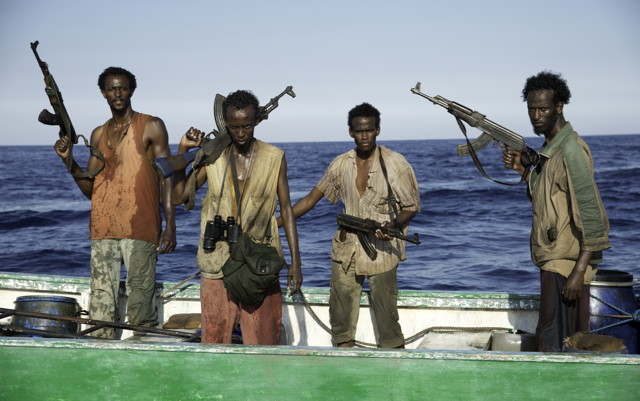 In 2009 Captain Richard Phillips, a long-time Masters, Mates, & Pilots member, fought for his life against Somali pirates for five days off the coast of Somalia. Captain Phillips and his crew aboard the Maersk Alabama survived the hijacking ordeal and the pirates did not. Captain Phillips wrote a book about his experience titled, “A Captain’s Duty,” which has since been adapted to film with Tom Hanks playing the starring role. Here is a trailer to the excellent film.
In 2009 Captain Richard Phillips, a long-time Masters, Mates, & Pilots member, fought for his life against Somali pirates for five days off the coast of Somalia. Captain Phillips and his crew aboard the Maersk Alabama survived the hijacking ordeal and the pirates did not. Captain Phillips wrote a book about his experience titled, “A Captain’s Duty,” which has since been adapted to film with Tom Hanks playing the starring role. Here is a trailer to the excellent film.
Many people, including Congress, are surprised to learn the Maersk Alabama carried food aid to Africa during that fateful trip. The Somalis, the very people the Maersk Alabama aimed to help, caused the crew of the Alabama the most harm. The crew now safe and Captain Phillips back at sea, the Maersk Alabama has returned to its regular route and stands ready now, just as then, to transport U.S. government and military cargo anywhere in the world at a moment’s notice. But the Alabama is threatened again. And today, just as then, those the ship aims to help most by carrying United States military cargoes, the United States government, are those causing the most harm.
 As MM&P President Don Marcus said in an interview with USA Today, “What the pirates couldn’t take away, Congress might.” It is difficult for Americans to believe that the members of Congress prefer political jockeying over properly governing but we see it every day in the news. Unfortunately, congressional members are unable to recognize the overwhelming value American flag vessels provide to our military and thereby put our men and women in the Armed Forces at unnecessary risk. Each year for less than one-third the cost of just one F-35 joint strike fighter jet, the Department of Defense gets access to virtually unlimited sealift capacity aboard American-flag cargo vessels to anywhere in the world. According to a recent study, the cost to replicate this sealift capability if done by the Department of Defense is around sixty-five billion dollars. This sealift capability is critical. After all, how do you suppose those jets, along with tanks, food, and helicopters, get overseas?
As MM&P President Don Marcus said in an interview with USA Today, “What the pirates couldn’t take away, Congress might.” It is difficult for Americans to believe that the members of Congress prefer political jockeying over properly governing but we see it every day in the news. Unfortunately, congressional members are unable to recognize the overwhelming value American flag vessels provide to our military and thereby put our men and women in the Armed Forces at unnecessary risk. Each year for less than one-third the cost of just one F-35 joint strike fighter jet, the Department of Defense gets access to virtually unlimited sealift capacity aboard American-flag cargo vessels to anywhere in the world. According to a recent study, the cost to replicate this sealift capability if done by the Department of Defense is around sixty-five billion dollars. This sealift capability is critical. After all, how do you suppose those jets, along with tanks, food, and helicopters, get overseas?
The Maritime Security Program, which provides regular funding to ensure these American-flag vessels are available to DoD, is under threat because of a $12 million funding anomaly. A couple years ago the Maritime Administration had a surplus in the Maritime Security Program account (another example of how efficient the program is; what government account ever has a surplus?) so MARAD requested from Congress an appropriated amount $12 million less than normal. Now because of Congress’s failure to pass a comprehensive budget this reduced appropriated amount is perpetuated by the Continuing Resolution, bringing the MSP funding up short.
The shortage means at least four American-flag ships that provide vital sealift capacity to our Armed Forces will be cut from the program. This may not sound like a big deal but in the world of American-flag deep sea vessels the loss of four ships is devastating. It not only means our military personnel may be left on the battlefield without essential supplies and armaments but it also means loss of revenue to American shipping companies, who may be forced out of business. And with the loss of those companies comes the loss of good sea-going jobs for American mariners. These mariners are highly skilled with many years of experience and as the ships disappear so does the vital mariner workforce.
If Congress fails to address this funding anomaly now it will cost untold multiples of the current $12 million shortfall to simply return the program to status quo. In the meantime our men and women in harm’s way are put at unnecessary risk because they are not receiving the supplies they so critically need. It is possible to let your congressional representatives know that you support addressing this funding anomaly. Go to this link and fill out a few fields to send letters to your congressional representatives. If we get enough voices sounding off, this funding anomaly can be fixed and we can fulfill our commitment to our military personnel overseas.
